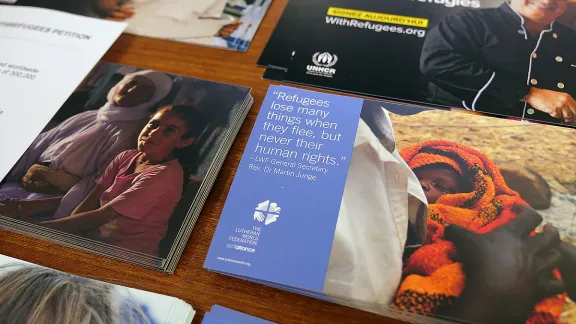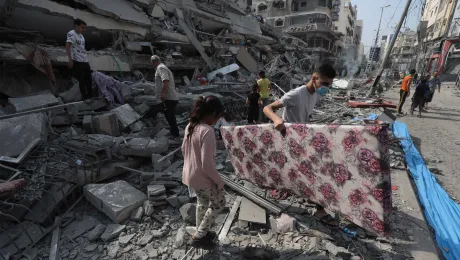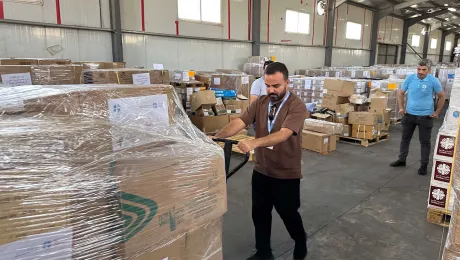
Refugees lose many things, but never their human rights: LWF and UNHCR visibility material at the panel discussion. Photo: LWF/ A. Danielsson
Panel discussion on fair representation of refugees in news reporting
(LWI) - Few media report the stories of refugees directly, is the finding of a new study about the representation of refugees and migrants in the media. Since the global refugee crisis arrived in Europe in late 2015, refugees have been a constant topic in European media. However, refugees, are hardly present in the reporting.
A panel of representatives from the World Association for Christian Communication (WACC), the World Council of Churches (WCC), The Lutheran World Federation (LWF) and the United Nations High Commissioner for Refugees (UNHCR) discussed the topic “Changing the Narrative: Media Representation of Refugees and Migrants in Europe” this week.
The panel took place at the presentation of a 2017 study, conducted by WACC and the Churches’ Commission for Migrants in Europe, showing how little refugees themselves are given a voice in reports concerning them. In the countries analyzed, only 21 percent of news items on migration and asylum referenced or quoted a refugee or migrant.
Promote communication rights of refugees
In fewer than half the articles, the people concerned were quoted directly. The representation also neither reflected the percentage of women among the refugees, nor the proportion of nationality and ethnicity.
“We want to promote the communication rights of refugees: to speak for themselves, to be represented fairly,” said Dr Stephen Brown, President of WACC-Europe. The goal of the project was to improve media representation of refugees, he said.
WACC communications officer Sara Speicher agreed. “There are stories about migration but the appearance of refugees and migrants in them is less common,” she said. According to the study, even articles mentioning or referencing refugees, in more than two third of the cases, treat them as a subject rather than a person speaking for themselves.
Language of images
“Much of what we see fits into a certain narrative: refugees are beneficiaries, they are the ”others”, they need to be grateful,” Cornelia Kästner, Senior Communications Officer at the LWF said. Having worked as a journalist for the LWF humanitarian and development department, she explained the LWF approach of bringing the stories and voices of refugees to the public.
“We are an implementing organization, so we see the people, we work with them. In our work, we have the rare chance to talk to those that everybody is talking about,” she said. “I asked myself: When does someone become a refugee? The answer is: in one sense never, because every time I visited a refugee settlement, I was talking to people.” Changing the narrative, she said, starts with respecting their dignity and their choices through ethical guidelines for consent on images, photos and video content.
Stories are often collected not by trained journalists but by field staff who are close to the people. In every case, staff are asked to also bring a personal quote from the people of concern, Kästner added. “When we send interview questions or ask someone to write a story for us, we always insist: include a quote from the refugees or the host community. Without that, we do not have a story. And make sure the quote is not simply an expression of gratitude, but something that really offers opinion and perspective.”
Can speak for themselves
Changing the narrative of refugees does not stop at fair representation but with getting an audience to listen and sympathize. LWF tried to create empathy with refugees through a simulation workshop at the World Exhibition in Wittenberg in the summer of 2017, Germany.
Leigh Foster of UNHCR introduced the #WithRefugees campaign of the United Nations refugee agency, which started in 2016.
“Media shows us how people who have been forced to flee have been dehumanized,” she said. “With the campaign we see how we can try to give them back their voice.” The platform campaign portrays refugees in their profession or with their dreams and ideas. “We are not proxies for refugees, they can speak for themselves,” Foster emphasized.
Foster commended the support of faith-based organizations such as the WCC and LWF in supporting the work of UNHCR, and in portraying them with dignity. “We want to continue bringing the people together on this issue,” she said. “We try to tell the world that refugees are ordinary people who have been forced to flee.”


